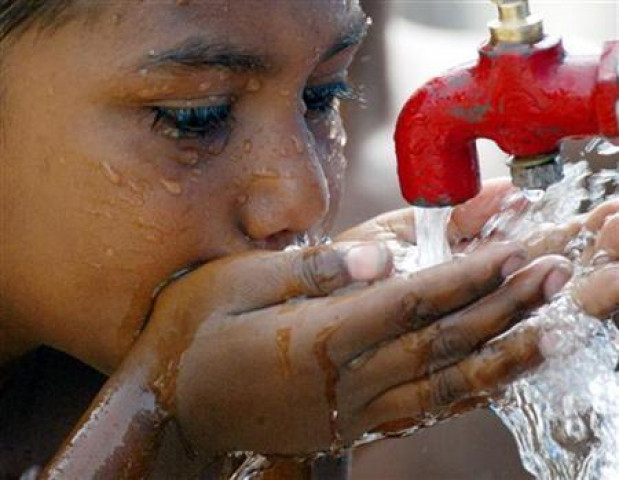Govt looks to draw on Korean experience in water management
Around $300,000 will be spent on a study to introduce system

PHOTO: REUTERS/FILE
The Punjab Local Government and Community Development (LGCD) department signed the memoire through which $300,000 will be spent on a study to introduce a smart water management system. The initiative will take place under the Punjab Intermediate Cities Improvement Investment Programme (PICIIP).
In the first phase, the program will be introduced for Sargodha by the PICIIP and KSP-ADB. Exim Bank Director KyongSeo Park Deuk-Koo, KOH Dongbu Engineering Executive Vice President K-Water and Senior Manager Je Young delivered presentations on the project. They touched upon its overview, the work scope of smart water management and a detailed plan.
KSP-ADB joint consulting will analyse the current status of the water management system in Sargodha. It will conduct an in-depth, practical and theoretical policy consultation to share Korea’s experience and knowledge on developing a smart water management system.
Under this project, proactive monitoring will take place to secure the quality and quantity of drinking water through smart devices. The PICIIP will support different civic upgrade programmes in intermediate cities of Punjab with the financial assistance of the Asian Development Bank (ADB).
The PICIIP aims to improve the services of water supply, sanitation, sewerage treatment, solid waste management and transport infrastructure, which will contribute to increasing economic activities and strengthening the business process. The programme aims to improve community health and the quality of life of Sargodha, Sahiwal, Sialkot, Bahawalpur, Rahim Yar Khan, and Dera Ghazi Khan residents.
Development Deputy Secretary Yasir Farhad, Programme Deputy Director Ali Raza Rao and officers from the Sargodha Municipal Corporation and Programme Management Unit (PMU) staff participated in the workshop related to this smart water management initiative.
A WWF Pakistan study points out that besides urbanization, excessive pumping of water is one of the main reasons for the rapid depletion of groundwater in the provincial capital. It indicates that the absence of any municipal water law, groundwater is pumped indiscriminately by industries and private housing schemes.
The study estimates that the water supply for domestic, industrial and commercial uses mainly comes from groundwater, which is estimated to be 3.79, 0.92, 0.77 million-cubic-meters (MCM) per day, respectively. WASA supplies water to most urban areas, while Lahore Cantonment Board, Walton Cantonment Board, Defense Housing Authority, Model Town Society, Pakistan Railway and a large number of private housing schemes are responsible for supplying water to their respective areas.
The study shows that private housing societies in the provincial capital pump 0.37 million-cubic-meters (MCM) per day to supply water to their residents. It highlights that in areas where the water supply network is not available, estimated extraction is 0.35 MCM/day, which means the total groundwater extracted by private housing schemes is approximately 0.71 MCM/day. In addition, the Public Health Engineering Department (PHED) runs rural water supply schemes in Lahore district. Data shows that the total domestic water consumption in Lahore is around 1,384 MCM per annum.
WWF officials believe underground water is running out fast in the country. Pakistan has become one of the most water stressed countries in the world and is rapidly heading towards becoming water scarce. Per capita availability of water had dropped below 1,000 cubic meters as compared to 5,650 cubic meters in 1947. While around 1,600 cubic meters of water was available per capita in India, major European countries had up to twice as much – ranging from 2,300 cubic meters in Germany to 3,000 cubic meters in France.
Similarly, various internal agencies have also warned that Pakistan could ‘run dry’ by 2025 as the country’s water shortage is touching alarming levels. According to a recent study conducted by the International Monetary Fund (IMF), Pakistan ranks third place in the world among countries facing an acute water shortage.
Experts believe that the entire Pakistan nation is at risk of water scarcity, regardless of their region of residence. Researchers indicate that the country is fast moving towards becoming the most water-stressed state by 2040 and the shortage poses a bigger threat to the country than terrorism.
Published in The Express Tribune, June 21st, 2019.



1725254039-0/Untitled-design-(24)1725254039-0-208x130.webp)















COMMENTS
Comments are moderated and generally will be posted if they are on-topic and not abusive.
For more information, please see our Comments FAQ